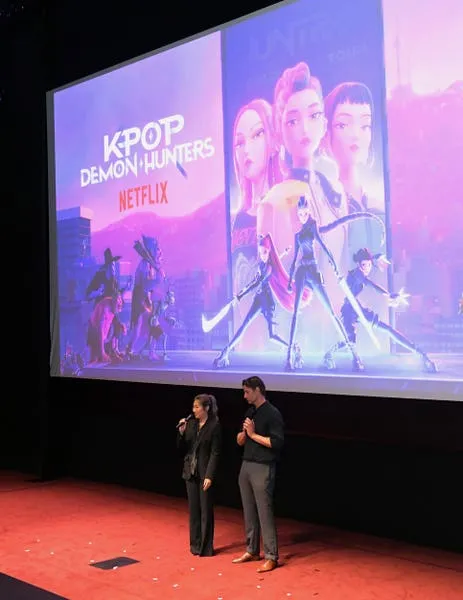Forbes contributors publish independent expert analyses and insights.
On June 23, 2025, Netflix and Sony Animation's fictional girl group HUNTR/X from the film KPop Demon Hunters was the most streamed girl group on global Spotify, outstreaming popular real-life girl groups like TWICE and KATSEYE in the process. Just days after the film's release, HUNTR/X has managed to capitalize on the film's success seemingly overnight, with several of their songs soaring to the top of the global Spotify charts. According to Pop Base, their song "Golden" reached the top 20 most popular songs, sitting at number 14 with a total of 2.78 million streams in a single day, and that's in addition to the seven other songs the KPop Demon Hunters soundtrack had chart on the same list. While this might seem like an anomaly, Netflix has managed to deliberately leverage the popularity of its films in tandem with fandom and the popularity of K-pop as a genre in an effective media strategy. Netflix has managed to turn fictional artists into real-world successes.
Kpop Demon Hunters, released on June 20, 2025, is an animated film that follows a k-pop girl group, HUNTR/X, that tour by day and fight evil demons by night. The concept on it's own is already highly engaging, and manages to bring in fans of K-pop, fans of animation, and fans of fantasy. Already, the film has a wide variety of viewers, and, through that variety, Netflix and Sony were able to capitalize on their full music rollouts. Since the songs were each featured in the film, rather than being featured in a companion compilation album, fans were already familiarized with the songs that are now charting.
K-Pop as an art form, is already one of the most successful vehicles for success in the music industry. With acts like the aforementioned girl group TWICE and other groups like BLACKPINK and BTS, the genre has shown a level brand loyalty and fandom that hasn't been seen for musical acts since the 90s, with fanbases of said groups often being international, multilingual, and more than willing to promote the groups they love. KPop Demon Hunters understands this and managed to capitalize on that formula, emulating the success of real life K-pop groups.
Conversations on social media only aided this campaign, with the music being top of mind and the virality of those discussions allowing people who may not have seen the film to still engage with the music. Kpop Demon Hunters has shown that HUNTR/X is more than just a part of the film's narrative; it's a legitimate girl group with actual streaming power.
I remember dancing in the club in 2019, and the song "On a Roll" performed by Miley Cyrus as her character Ashley O in Black Mirror began to play. It had never dawned on me until that moment that Cyrus’s success as an artist, despite that particular episode explicitly showcasing how her character was trapped and being controlled by the music industry, would cause fans to ignore the themes of Black Mirror and still stream the song to success. For months, the song would be played, and people would take to the dance floor, singing it word for word. Even online, people were discussing the song’s duality between authenticity and satire.
The song became a real-world hit, charting at number 65 on the UK Singles Chart and number 18 in New Zealand, and even landed on Billboard's coveted best songs list for 2019.
This shows that the success of Netflix's fictional acts is more than just a coincidence; it's deliberate.
Having good music doesn't automatically equate to being a global success, but when a streaming juggernaut like Netflix is in your corner, doors open.
Netflix has the fiscal means to hire top producers, writers, and singers. Often times, people can feel the difference between songs made for bands in films and songs made for bands that are successful in real life. For example, the song "Takedown" from the film was perfomed by the real girl group TWICE, and the polish and authenticity they represent shines through.
It also helps that fans are already familiar with the story that's associated with each of these songs. When fans listen to the song "Golden," they can relive the struggle and eventual triumph that the cast of characters went through to create and perform that single in the film. So, when fans stream that song, they aren't just listening to it because they like it; they're also listening to it to relive those moments in the film which, in the end, might lead them to rewatch the movie—a win-win for Netflix.
We live in a world where fictional acts turned virtual idols, like the Gorillaz, Hatsune Miku, or the Squid Sisters from Nintendo's Splatoon, can fill arenas. With that knowledge, it makes complete sense that a streaming service like Netflix, which dabbles in multiple forms of content, capitalizes on its music which it can root in long-form storytelling rather than short-form music videos.
In the end, HUNTR/X is more than just a one-off trend. If anything, they've shown that they have the staying power, global reach, and storytelling necessary to not only push for a second film but also push for increased space and visibility for other fictional pop stars, even across genres. Netflix could be sitting on a potential goldmine by offering something different to a lane of serious competitors in an already saturated industry. If HUNTR/X proves anything, it's that people aren't just watching fictional artists in films; they're streaming them.
